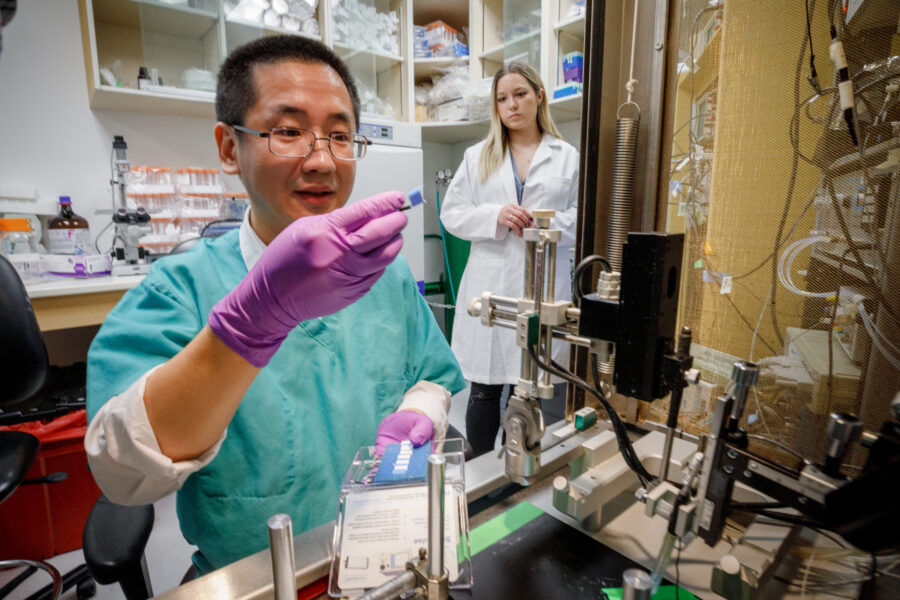When Hanjun Wang, MD, joined UNMC in 2007 as a postdoctoral fellow, he was driven by a simple spark: curiosity. Nearly two decades later, that spark has evolved into a passion that has propelled him into his newest role. Effective July 1, Dr. Wang will become vice chair of research in the UNMC Department of Anesthesiology.
Dr. Wang’s scientific journey began with a focus on cardiovascular physiology, particularly the mechanisms of heart failure and exercise intolerance. But over time, and with the encouragement of mentors like former department chair Steven Lisco, MD, his research expanded to include pulmonary physiology, lung injury and visceral pain. These areas, Dr. Wang said, are tightly interwoven with the department’s clinical mission, especially in critical care.
“I think of organs almost like individuals during a crisis,” he said. “The heart or lung compensates, overworks and eventually fails, like a society under stress. That’s how I approach my models. I draw insight from history, social systems, even art. Everything connects.”
Dr. Wang envisions a future focused on translational science, where discovery meets impact. His vision centers on building a robust pipeline that connects basic science to bedside application: identifying therapeutic targets, developing precise drug formulations and testing those treatments in preclinical and clinical settings.
A cornerstone of this vision is strategic collaboration. Dr. Wang, the Margaret R. Larson Professor of Anesthesiology, said he plans to harness campuswide expertise in pharmaceutical sciences and bioengineering to tackle unmet medical needs in anesthesia and critical care.
“We’re not chasing funding,” he said. “We’re chasing solutions. If you understand the mechanisms, the funding will follow.”
UNMC Department of Anesthesiology Chair Andrew Patterson, MD, PhD, said Dr. Wang’s goal for the next five years is to foster greater integration between basic research, education and clinical teams in the department as he succeeds Karsten Bartels, MD, PhD, in the role.
“Dr. Wang will enhance our translational research program and accelerate new drug discovery programs designed to significantly impact patient care,” Dr. Patterson said.
Dr. Wang’s commitment to solving clinical problems is highlighted in his innovative work in targeted drug delivery, aiming to reformulate existing pain medications to act locally and precisely, minimizing systemic side effects. It’s an approach that’s garnered multiple NIH grants and industry collaboration.
Dr. Wang said his goal is to create a research ecosystem or platform that supports investigators at every stage and from every background, whether they’re seasoned faculty or residents with a clinical question.
“If we build a strong network, then any idea, from any physician, can find the right collaborators and resources,” he said. “We want to make it easier to succeed, together.”

Congratulations Hanjun! This is a well deserved promotion and a great opportunity for you! The department will benefit from your expertise and vision for the future.
Congratulations!!!
Congratulations on your appointment Dr. Wang! Well deserved!
Congratulations, Dr. Wang!!
Congratulations, Hanjun, on this highly deserved recognition!
Congratulations, Dr. Wang!
Congratulations Hanjun!